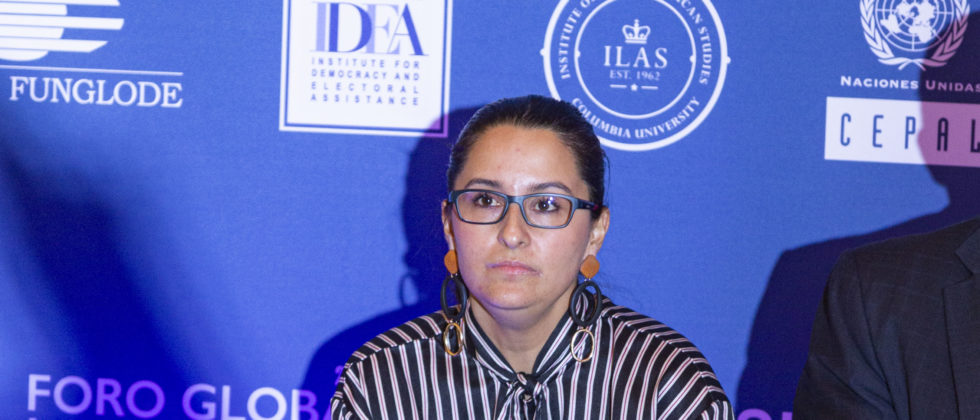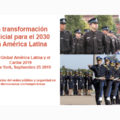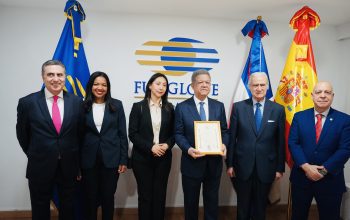news
Paola González: “police forces are not, nor should they be the only ones responsible for security in our countries. They are the visible face for good and for bad and that entails more challenges.”
September 26, 2019
The panel “Challenges of public order and security in contemporary democracies” closes the first session of the Global Forum
New York – The session’s third panel featured the topic of public order and security as the focus of debate. Liliana Mesías García, Doctor in Government and Public Policy; and Paola González, Political Scientist, Co-authors of the IDB/Inter-American Dialogue Report (2018): “Police Transformation in Latin America for 2030” presented before the public to start the debate. They were accompanied by a panel with Maria Haberfeld, Director, NYPD Police Studies Program; Coordinator, Law Enforcement Leadership On-Line Certificate and Professor of Police Science, Department of Law, Police Science and Criminal Justice Administration, John Jay College of Criminal Justice; and Karelia Villa Mar, Senior Specialist, State Modernization; Cluster Lead, Citizen Security and Justice, Interamerican Development Bank (IDB).
The role of moderator was held by Roberto Obando Prestol, Programs Director, Chief of Party, Citizen Security and Justice, Pan-American Development Foundation (PADF).
Paola González began her presentation with the premise that “police forces are not, nor should they be the only ones responsible for security in our countries. They are the visible face for good and for bad and this entails more challenges.”
In general, she emphasized that security policies must be more effective but more democratic as well in the contemporary world.
“Obedience and discipline remain the principle focus for police training, not integration and coordination with other entities,” she continued.
González explained that the police forces in Latin America have these characteristics: they are heterogenous in their structure; they are vertical and bureaucratic institutions; the majority use more control rather than prevention and they are characterized by establishing distance from the citizen.
Many experts and studies point out the need to increase personnel within the police forces, but, according to González, “without reform, without confidence in the institution, without improving training, the situation will not easily improve.”
Very low citizen perception of confidence
The political scientist and consultant at IDB said: “We view with worry the following data point: only 35% of the population in Latin America trust the police.” In that sense, she explained that the countries that have the least confidence in state police institutions are Mexico, with 19%, Nicaragua 21% and El Salvador, 22%. The countries that have the most trust are Uruguay with 59%, Costa Rica with 51% and Chile with 48%. (Latinobarómetro 2018)
For her part, the co-author of the report “Police Transformation in Latin America for 2030,” Liliana Mesías listed dilemmas in the field and where they are headed.
Civility vs. Militarization for interior security. “although there are advances coming from the democratic consolidation in Latin America, there is the persistence of a militarized vision of security, hierarchy, that gives priority to control over the prevention and non-involvement of the community. Furthermore, high crime and organized crime put pressure against civilian spaces.”
Professionalization of the police force. “There is a necessity to establish a better recruited police force, created and formed with clear paths towards professionalism.”
Introduction of transparency and accountability practices. “High levels of corruption persist. It is urgent to create control and internal and external accountability mechanisms.”
Adoption of technology and information systems. “This is indispensable in the fight against crime, especially for new forms of crime, but technology is not an end in itself. The most complicated aspect is to adapt technology to the context and at the regional level the conditions do not exist for this adaptation. This creates many expectations that are not met. It’s necessary to evaluate!
Consolidation of the community’s relationship with the police. On this topic they mentioned the prevention of crime through closer relations between the police and the community, improving mutual trust between them, the reorientation of patrolling, the decentralization of authority towards small territorial units, the establishment of mechanisms of periodic interaction between police and the community. “the decentralization of decision-making: far from the reality of current times.”
For her part, María Haberfeld highlighted that the police have the same challenges as all of the world, they are not just in Latin America. “We have had the same challenges for many years in all the countries. It’s about integrity.”
The director of the NYPD Police Studies Program emphasized that “democracy is difficult without a legitimate and effective police force, and without corruption.” She also said that a change is needed on police, regarding how citizens view the profession. “How we see the police is a global problem.”
Haberfeld emphasized the need for good training, as did the rest of the panelists. “It’s not about numbers, but about the type of police that we have. Respect comes from professionalism.”
Meanwhile, Karelia Villa wanted to make it clear that “the topic of security is a matter of development. You cannot have development if there is not rule of law and security in our countries.”
In terms of education and training she said that “the police in the region are very different, as well as the quality of their training. We see training as a common denominator. The training curriculums in the region are very disparate, as is quality.”
 View Presentation
View Presentation
Panel 3: Challenges of public order and security in contemporary democracies
Author: Kevin Casas, Paola Gonzälez Cepero & Liliana Mesías
More information about the Global Forum Latin America and the Caribbean
About the panelists: https://www.globalforumlac.org/en/panelistas/
Join the conversation @GlobalForumLAC on Twitter, Facebook and Instagram.















